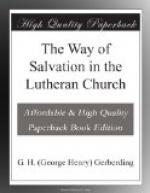Now, from these words, and others in the same chapters, two things are plain: First, that the Comforter came as Christ’s substitute; Secondly, that He came to abide. While Jesus was to be absent, as far as His visible presence was concerned, the divine Comforter, the Holy Spirit, was to take His place. His presence was to substitute Christ’s. But if He had come to be present only briefly, and occasionally, after long intervals of absence, it would be a poor filling of the painful void. Evidently the impression designed to be made by the words of Jesus was, that the Holy Spirit would come to abide. And this is made still more clear by the plain words of Jesus quoted above “I will not leave you orphans;” “He shall abide with you forever.” He came, then, as a substitute; He came also to abide forever.
The revival system is, however, built up on the idea that He comes and goes. He visits the Church, and leaves it again. At so-called revival seasons the Church has a Comforter. During all the rest of the time she is left in a desolate or orphaned state. Thus is the revival system built up on an entire misconception and misapprehension as to the coming and abiding of the Holy Spirit.
It likewise misconceives entirely the operations of the Spirit. The idea seems to be that this Blessed One operates without means, directly, arbitrarily and at haphazard. The Word and Sacraments are not duly recognized as the divinely ordained means and channels, through which He reaches the hearts of the children of men. That this is an unscriptural idea we have shown elsewhere. That the Spirit uses the means of Grace as channels and instruments, through which He comes and operates on the hearts of men and imparts to them renewing and sanctifying Grace, is taught all through the New Testament. We need not enlarge on these points again, but refer our readers to what has been written above on this subject.
Our second objection to the modern revival system arises out of the first. Because of the errors concerning the coming and the operations of the Holy Spirit, the system undervalues the divinely-ordained means of Grace. Little if any renewing Grace is expected from the sacrament of Christian Baptism. Few if any conversions are expected from the regular and ordinary preaching of the Word. Little if any spiritual nourishment is expected from the sacrament of the Lord’s Supper. Who that has attended such meetings has not heard the idea of Grace bestowed




